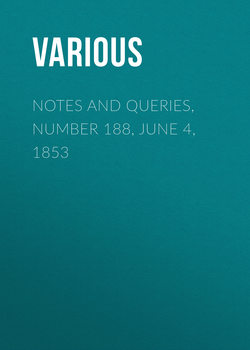Читать книгу Notes and Queries, Number 188, June 4, 1853 - Various - Страница 3
Notes
DEVONIANISMS
ОглавлениеMiserable.—Miserable is very commonly used in Devonshire in the signification of miserly, with strange effect until one becomes used to it. Hooker the Judicious, a Devonshire man, uses the word in this sense in the Eccl. Polity, book v. ch. lxv. p. 21.:
"By means whereof it cometh also to pass that the mean which is virtue seemeth in the eyes of each extreme an extremity; the liberal-hearted man is by the opinion of the prodigal miserable, and by the judgment of the miserable lavish."
Few.—Speaking of broth, people in Devon say a few broth in place of a little, or some broth. I find a similar use of the word in a sermon preached in 1550, by Thomas Lever, Fellow of St. John's College, preserved by Strype (in his Eccles. Mem., ii. 422.). Speaking of the poor students of Cambridge, he says:
"At ten of the clock they go to dinner, whereas they be content with a penny piece of beef among four, having a few pottage made of the broth of the same beef, with salt and oatmeal, and nothing else."
Figs, Figgy.—Most commonly raisins are called figs, and plum-pudding figgy pudding. So with plum-cake, as in the following rhymes:—
"Rain, rain, go to Spain,
Never come again:
When I brew and when I bake,
I'll give you a figgy cake."
Against is used like the classical adversùm, in the sense of towards or meeting. I have heard, both in Devonshire and in Ireland, the expression to send against, that is, to send to meet, a person, &c.
The foregoing words and expressions are probably provincialisms rather than Devonianisms, good old English forms of expression; as are, indeed, many of the so-called Hibernicisms.
Pilm, Farroll.—What is the derivation of pilm=dust, so frequently heard in Devon, and its derivatives, pilmy, dusty: it pilmeth? The cover of a book is there called the farroll; what is the derivation of this word?
J. M. B.
Tunbridge Wells.
